With research interests in areas as varied as brain development, music composition, and the economics of happiness, nearly 60 new faculty members were hired or appointed to full-time, tenure-track positions at the University for the 2011-2012 school year. The following nine newcomers represent just a sampling of the rich crop of new professors who promise to add to the breadth of scholarship within the McGill community.
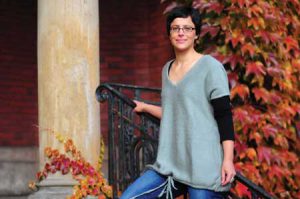
Dana Anaby, Assistant Professor
School of Physical & Occupational Therapy
Hometown: Tel-Aviv
Coming from: McMaster University
Why McGill? It is a top-calibre institution devoted to internationalism and intensive research. The School of Physical and Occupational Therapy leads a cutting-edge approach to disability and health and this drew me to it. Of course, the university is also located in one of the most dynamic cities in North America.
Research interests: My research focuses on quality of life and community participation of youth with disabilities.
How will your work benefit the average person? My goal is to promote a sense of belonging of children with disabilities within their communities, and ultimately contribute to their well-being.
When did you know you wanted to follow this career path? I was practicing as an occupational therapist in Israel and I had a strong passion to test clinical intervention and improve the efficacy of the practice.
Your most exciting professional moment thus far? There have been many, but the most exciting moment was when I earned my PhD and defended my thesis.
What would you like to accomplish in the next 10 years? I would like to develop an international interdisciplinary research centre for childhood disability.
Last book read? A Son of a Smaller Hero by Mordecai Richler.
How do you relax in your spare time? I do yoga and take long walks in the park.

Jun Song, Assistant Professor
Department of Materials Engineering
Hometown: Yongzhou, China
Coming from: Providence, RI, USA
Why McGill? Top-notch faculty colleagues, collaborative research environment and cultural metropolis – Montreal.
Research interests: My research focuses on multi-scale modeling of nanomaterials. In my research group, we utilize state-of-the-art modeling and simulation techniques to reveal the fundamental deformation and failure mechanisms that dictate material behaviors at different length/time scales. The goal of my research is to enable precise engineering of properties for nanomaterials of different hierarchy structures, in order to help design robust next-generation devices and appliances.
How will your work benefit the average person? Two major research thrusts I am pursuing are (a) designing strong, tough and light-weight structural metals for aerospace and automobile applications; (b) improving life-time and power capacity for renewable energy materials. Both of them are direct routes towards increasing energy efficiency and reducing carbon emission, thus helping build a more eco-friendly world that would benefit everybody.
When did you know you wanted to follow this career path? The moment of PhD hooding at Princeton University.
Your most exciting professional moment thus far? My first day in my office at McGill.
What would you like to accomplish in the next 10 years? Establish a top multi-scale materials modeling program that McGill would take pride in.
Last book read: “The Invisible Gorilla” by Christopher Chabris and Daniel Simons
How do you relax in your spare time? Reading; exploring beautiful Montreal.
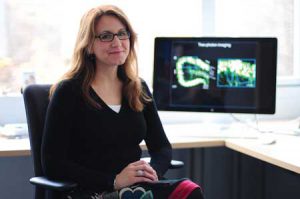
Alanna J. Watt, Assistant Professor
Department of Biology
Hometown: Winnipeg, MB
Coming from: University College London, UK
Why McGill? McGill is famous for neuroscience because of luminaries like Wilder Penfield and Donald Hebb; I am thrilled to be joining its thriving neuroscience community.
Research interests: I study brain development. I am fascinated by the question of how something as complex as the brain can assemble itself.
How will your work benefit the average person? By learning how the brain develops normally, we hope to also unravel what goes wrong with this process in developmental disorders, and ultimately how to prevent or treat them.
When did you know you wanted to follow this career path? I started volunteering in a lab as an undergraduate student, and got hooked on the scientific life. Science is an adventure; you never know where your research will lead you. This makes it an exciting career.
Your most exciting professional moment thus far? For me, the excitement in science comes long before I write a paper or give a talk. The best moments are when I do an experiment that answers a question that I have been trying to answer for months or longer.
What would you like to accomplish in the next 10 years? I hope that my research will add to our understanding of how the brain develops. I also look forward to mentoring and teaching students.
Last book read: The Immortal Life of Henrietta Lacks, by Rebecca Skloot
How do you relax in your spare time? With my family. Watching my children grow and observing how their brains develop – for instance, since we moved to Montreal, they are learning French, and are also learning to skate – is a constant inspiration for me as a scientist!
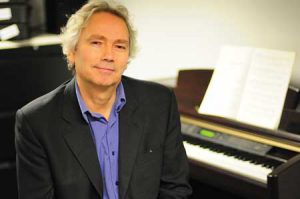
Philippe Leroux, Associate Professor
Schulich School of Music
Hometown: Boulogne Billancourt, Hauts-de-Seine, France
Coming from: IRCAM Institut de Recherche et Coordination Acoustique/Musique Paris, and Université de Montréal where I was Invited Professor for Composition.
Why McGill? It is a fantastic place for music and research in music
Research interests: The analysis of the activity of composition; the relationship between music and human gesture in music composition; the mixed music and contributions of new technologies in composition
How will your work benefit the average person? For example the protocol we made at IRCAM about the activity of composition has been used in the Renault automobile factories. But more generally, I think that everybody listens to music and we invent the music of tomorrow.
When did you know you wanted to follow this career path? When I was 12 years old, I thought that I would become either a composer or mathematician. When I was 17, I definitively knew that I’d become a composer.
Your most exciting professional moment thus far? When I composed music that I knew really succeeded and that the public really enjoyed and appreciated.
What would you like to accomplish in the next 10 years? Write beautiful music, to further lead my students and to make advances in the understanding of what the music of tomorrow will be like.
Last book read: La sombra del viento de Carlos Ruiz Zafon.
How do you relax in your spare time? I like to ski and to fish with my children.
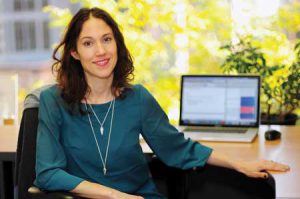
Emmanuelle Vaast
Associate Professor of Information Systems
Desautels Faculty of Management
Hometown: Paris, France
Coming from: Long Island University, New York
Why McGill? Wonderful academic institution, exciting research, great teaching, collegial atmosphere. Who could hope for a better environment?
Research interests: Examining how information systems and new media affect how we work, communicate, collaborate, etc. in many different fields.
How will your work benefit the average person? I am not sure who this “average person” is, but most of us today are increasingly relying upon IT and new media in all aspects of our lives. I’d like for my work to help people better understand what is going on underneath these new, widespread practices.
When did you know you wanted to follow this career path? I never really made a conscious decision to become a professor. It just happened like this, but I knew very young that I loved writing articles. I created my own journal at six. Its quality was really poor, but it sure made me very happy to write it.
Your most exciting professional moment thus far? None in particular jumps at me, but there is something very exciting about getting to hear and talk to accomplished researchers who are passionate about their projects.
What would you like to accomplish in the next 10 years? I would like to continue developing new research projects, develop new courses related to my research interests, and continue growing in the McGill community.
Last book read: The Bonfire of the Vanities by Tom Wolfe (yes, I was some 25 years late to this party.)
How do you relax in your spare time? Yoga, and spending quality time with my family.

Mark Fathi Massoud, Assistant Professor
Faculty of Law
Institute for Health and Social Policy
Hometown: San Jose, California
Coming from: University of California, Santa Cruz
Why McGill? The work across campus in human rights and international law.
Research interests: The development of law and civil society in conflict settings and fragile states; human rights; law and development in Sudan
How will your work benefit the average person? As long as the average person cares about humanitarian crises and its possible solutions, my work reveals the complex ways in which law plays a role – what it does, what it fails to do, and the challenges faced by legal activists.
When did you know you wanted to follow this career path? Traveling in South Africa in 1998 for a research project on the post-apartheid constitution, I began to think about the gap between legal and social change in many parts of the world, which later helped to lead to my current work in Sudan.
Your most exciting professional moment thus far? Contracting a deadly strain of malaria in South Sudan last year.
What would you like to accomplish in the next 10 years? With my research, I hope to make a constructive difference in scholarship and policy; and with my teaching, I hope to energize my students to be leaders in the world around them.
Last book read: I have just read Azar Nafisi’s “Reading Lolita in Tehran.” I recommend it for young professors.
How do you relax in your spare time? An evening at l’Orchestre symphonique de Montréal or Les Grands Ballets.

Heather B. MacIntosh, Assistant Professor
School of Social Work
Hometown: Ottawa
Coming from: University of Ottawa
Why McGill? New program in Couple and Family Therapy, close to Ottawa and research collaborators in Ottawa and Toronto.
Research interests: Trauma and developing therapies that are accessible to trauma survivors, Couple and Family Therapy, Same Sex Marriage.
How will your work benefit the average person? Most people have some kind of difficult experience or trauma in their lives. My work is focused on making the therapy experience more positive and successful when people want to seek help to work out the issues related to their difficult experiences.
When did you know you wanted to follow this career path? In 2000… started graduate school and became aware of the potential for making an impact on a systemic level which adds to my sense of purpose in doing clinical work individually and with couples and families.
Your most exciting professional moment thus far? That’s a really tough question. Presenting the research on the Same Sex Marriage study was pretty exciting.
What would you like to accomplish in the next 10 years? I would like to develop an evidence-based therapy process for couples dealing with trauma that does not make the assumption that participants in the therapy have the capacity to regulate their own emotional distress, reflect upon the experience of their partner, maintain empathy and openness and experience a wide array of emotional responses. These assumptions underlie most approaches to couple therapy and are not helpful to trauma survivors whose growing-up experiences may not have allowed them to develop these capacities.
Last book read: Dissociation and the Dissociative Disorders; John O’Neill ed.10.
How do you relax in your spare time? Singing, sitting by the fire reading, walks in the woods; fairly typical Canadian pursuits.
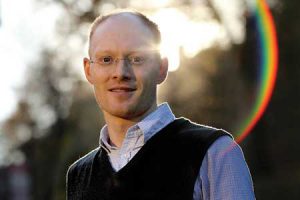
Chris Barrington-Leigh
Assistant Professor
Institute for Health and Social Policy;
School of Environment
Hometown: I don’t know what that is, in this day and age. Pieces of my heart are in (inter alia) Vancouver, Wyoming, California, Edmonton, and already Montreal.
Coming from: UBC
Why McGill? Great students!
Research interests: Economics of happiness and the economics of climate change.
How will your work benefit the average person? Aren’t those the two most important issues for humankind, given that we want to find out how to thrive, sustainably?
When did you know you wanted to follow this career path? Hmm, which career path? I was a physicist for 12 years before becoming an economist. However, maybe: when I was 11 years old.
Your most exciting professional moment thus far? Every time a bright and eager student walks in my door.
What would you like to accomplish in the next 10 years? I would like to see a life satisfaction question on the Canadian Census.
Last book read: Born to Run by Christopher McDougall
How do you relax in your spare time? I climb things, cross-country ski, and run: relaxation for the mind, maybe.
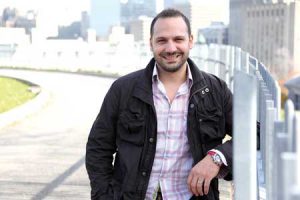
Armando Bertone, Assistant Professor
Department of Educational & Counselling Psychology
Hometown: Montreal. I’m a Montrealer, through and through.
Coming from: l’Université de Montréal’s Psychiatry Department. I was a research professor at UdeM for two years before coming to McGill. I still maintain strong ties with my colleagues and continue to direct a lab situated at the Rivière-de-Prairies Hospital, a UdeM-affiliated psychiatric hospital for children.
Why McGill? Most of my work concerns cognitive neuroscience and autism, set within a developmental context. McGill offers a dynamic environment within which to pursue such research. For example, research expertise in our department spans from cognition in neurogenetic conditions through to social policy issues – an incredibly rich context that influences and facilitates how we can transfer knowledge from the lab to the public.
Research interests: For the most part, my research concerns the understanding of brain alterations that can account for sensory-related cognition and behavior in autism, related neurodevelopmental conditions and during typical development.
How will your work benefit the average person? In the lab, we use a variety of approaches to define how typically developing and persons with autism process and react to different types of sensory information – there are differences. We are presently transferring this knowledge by optimizing teaching and intervention techniques used with kids with specific sensory-contingent strengths and challenges, such is the case in autism.
When did you know you wanted to follow this career path? In 2003, after publishing my first paper as first author. I felt a sense of accomplishment, being officially accepted into the scientific community. Seeing a research question materialize into a published paper for the first time was very motivating.
Your most exciting professional moment thus far? My most exciting moments now are seeing my students succeed, whether by being recognized by awards or just being proactive in the lab, or giving a solid presentation or talk.
What would you like to accomplish in the next 10 years? Create a research environment where people are motivated, stimulated and more often than not, laughing.
Last book read: Don’t remember! I haven’t read a book in about five years … I’m an information junkie with a short attention span and two young children. When I do read books, I usually revert to the classics like Descartes’ Discourse on the Method.
How do you relax in your spare time? I play hockey at least once a week.
